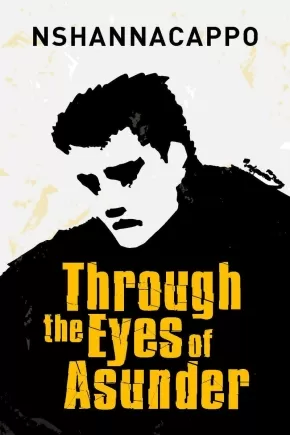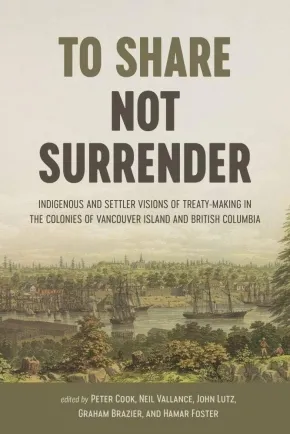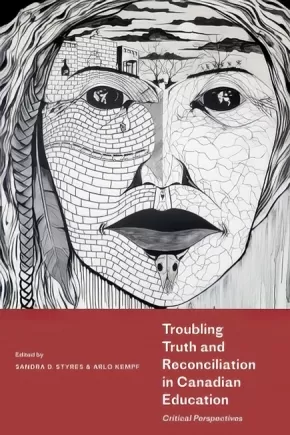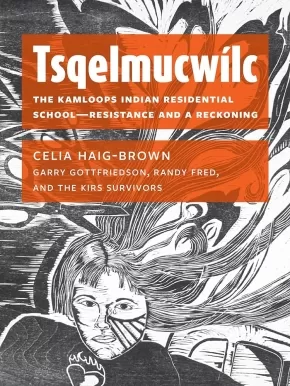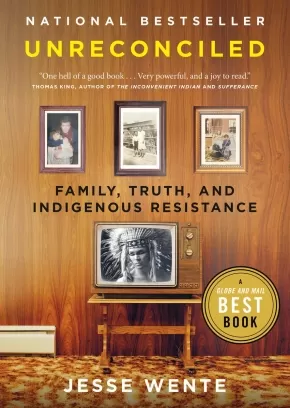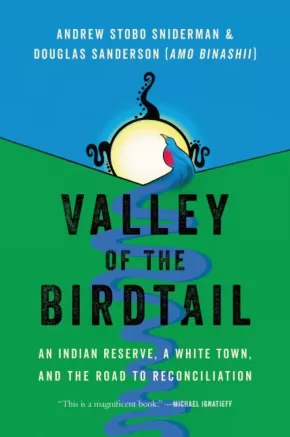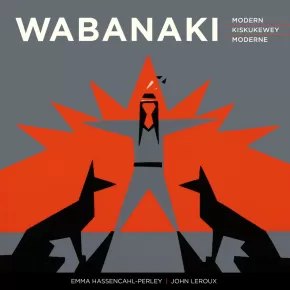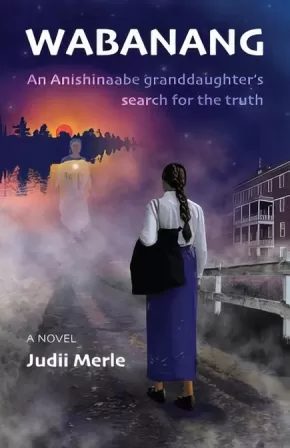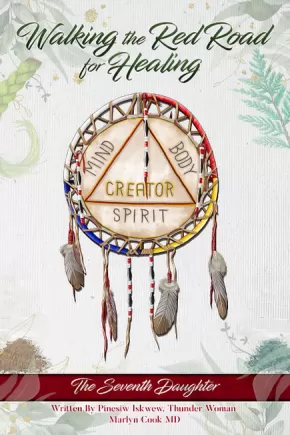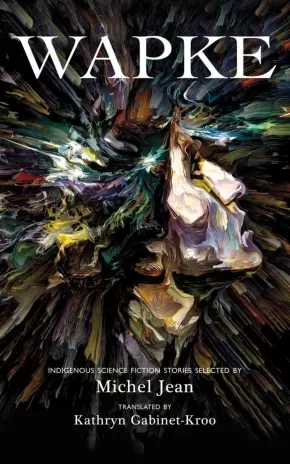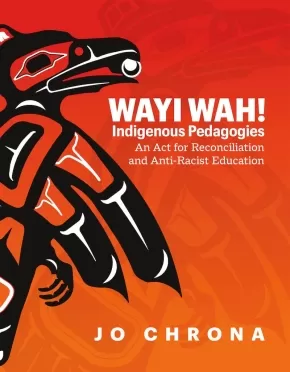First Nations
Synopsis:
After a hunting trip one fall, a family in the far reaches of so-called Canada’s north return to nothing but an empty space where their home once stood. Finding themselves suddenly homeless, they have no choice but to assimilate into settler-colonial society in a mining town that has encroached on their freedom.
An intergenerational coming-of-age novel, This House Is Not a Home follows Kǫ̀, a Dene man who grew up entirely on the land before being taken to residential school. When he finally returns home, he struggles to connect with his family: his younger brother whom he has never met, his mother because he has lost his language, and an absent father whose disappearance he is too afraid to question.
The third book from acclaimed Dene, Cree and Metis writer Katłįà, This House Is Not a Home is a fictional story based on true events. Visceral and embodied, heartbreaking and spirited, this book presents a clear trajectory of how settlers dispossessed Indigenous Peoples of their land — and how Indigenous communities, with dignity and resilience, continue to live and honour their culture, values, inherent knowledge systems, and Indigenous rights towards re-establishing sovereignty. Fierce and unflinching, this story is a call for land back.
Reviews
"Absolutely exquisite. Told with such love and gentle ferocity, I’m convinced This House Is Not A Home will never leave those who read it. I am in awe of what I’ve witnessed here. Mahsi cho, Katlia. Bravo! " — Richard Van Camp author of The Lesser Blessed and Moccasin Square Gardens
Additional Information
192 pages | 5.50" x 8.50" | Paperback
Synopsis:
From epic ventures into mythic and fantastical tales to the everyday trials of getting the laundry done, NShannacappo’s debut poetry collection follows many journeys through darkness to hope, healing and heroism. Pure and hauntingly beautiful turns of phrase sound out in the voices of angels, monsters and demons, mythic characters, and the sometimes wry, sometimes grieving voice of a man once broken in heart, spirit, and mind. Through the Eyes of Asunder begins and ends with hope, and takes the reader through sorrow and sadness to bright moments of happiness and love.
Reviews
“Neal Shannacappo is a spiritual thinker. The poetry and life’s perspectives he shares in this collation remind us of the unconditional love and support one can access through the Creator-given learning ways we as human beings are blessed to be born with. Read his words! Feed them to your heart, digest them spiritually and you will benefit from the medicine intended in every word and stanza.”—Albert Dumont, 2021–2022 Poet Laureate for Ottawa and author of Sitting by the Rapids.
“Reading this book, it felt many times like I had stumbled upon a shoebox filled with letters not sent and journals put away for safekeeping. You feel like you shouldn’t pry, but you just can’t help yourself. It was a wonderful read.”—John Brady McDonald, author of KITOTAM
Additional Information
143 pages | 6.00" x 9.00" | 6 illustrations | Paperback
Synopsis:
Too often, history and knowledge of Indigenous-settler conflict over land take the form of confidential reports prepared for court challenges. To Share, Not Surrender offers an entirely new approach, opening scholarship to the public and augmenting it with First Nations community expertise.
The collection appraises the historical and present-day relevance of treaty-making in the colonies of Vancouver Island and British Columbia. The authors take us back to when James Douglas and his family relocated to Fort Victoria on Vancouver Island in 1849, critically tracing the transition from treaty-making in the colony of Vancouver Island to reserve formation in the colony of British Columbia. Informed by cel’aṉ’en – “our culture, the way of our people” – this multivocal work explicitly addresses the tensions between academic research, Indigenous knowledge, and local experience. The collection includes essays, translations/interpretations of the treaties into the SENĆOŦEN and Lekwungen languages, and contributions by participants of the Songhees, Huu-ay-aht, and WSANEC peoples.
The chapters demonstrate that the continuing inability to arrive at equitable land-sharing arrangements stem from a fundamental absence of will with respect to accommodating First Nations world views. To Share, Not Surrender is an attempt to understand why, and thus to advance the urgent task of reconciliation in Canada.
The multiple perspectives presented in this important work will find equally diverse audiences: Canadian historians, scholars and students of Indigenous studies, ethno-historians, legal historians, lawyers practising in the areas of Aboriginal law, and researchers preparing historical reports on First Nation land claims.
Reviews
"The past is with us and history matters. Read To Share Not Surrender as a great example of how there can be different interpretations of the past." — Robin Fisher, The British Columbia Review
"After James Douglas negotiated treaties on Vancouver Island, he never made another in BC. Why not? Some of the foremost experts in the field work here to answer this question, analyzing Douglas’s policies and their lasting impact on BC First Nations’ continuing battle with rights and title." — Daniel Boxberger, professor emeritus, anthropology, Western Washington University
"The connection that To Share, Not Surrender makes between the events of the 1850s and 1860s and the modern-day treaty process in British Columbia is extremely valuable. It helps the reader develop a better understanding, not only of colonial history, but also of the relevance of Indigenous law to territorial claims today." — Kent McNeil, author of Flawed Precedent: The St. Catherine’s Case and Aboriginal Title
Educator Information
Contributors: Keith Thor Carlson, Robert Clifford, Emchayiik Robert Dennis Sr., STOLCEL John Elliott Sr., Elmer George, Stephen Hume, Maxine Hayman Matilpi, Kevin Neary, Adele Perry, Sarah Pike, Chief Ron Sam, and Laura Spitz
Additional Information
330 pages | 6.00" x 9.00" | Paperback
Synopsis:
In this final installation of the Overhead Series, Lucy Hemphill once again transports the reader with intimate revelations on identity by exploring both her personal and ancestral relationship to the forest and the quiet sentinels that root together everything. Hemphill’s prose is extraordinary in its combination of self-awareness yet unselfconscious honesty and skillful restraint, creating a sense of connection under the tangle of foliage and limb that ever-reach skyward. Masterfully illustrated by artist Michael Joyal, his evocative dendrological drawings contribute to the overall sensory and transcendent experience.
Reviews
"Lucy Hemphill has done a marvellous thing. Her book is a passkey that opens a door into the forest of her childhood. Her voice is gentle but direct, the author tells us the story of trees, their gift and our loss if we are not careful. Enhanced with Michael Joyal’s rich illustrations, Hemphill uses her Indigenous language to teach us that trees are our ancestors, living spirits, and as such we are to honour them." – Mary Barnes
Educator & Series Information
This book is part of the Overhead Series.
Additional Information
96 pages | 8.50" x 5.50" | 20 illustrations | Fiction
Synopsis:
Troubling Truth and Reconciliation in Canadian Education offers a series of critical perspectives concerning reconciliation and reconciliatory efforts between Canadian and Indigenous peoples. Indigenous and non-Indigenous scholars address both theoretical and practical aspects of troubling reconciliation in education across various contexts with significant diversity of thought, approach, and socio-political location. Throughout, the work challenges mainstream reconciliation discourses. This timely, unflinching analysis will be invaluable to scholars and students of Indigenous studies, sociology, and education.
Contributors: Daniela Bascuñán, Jennifer Brant, Liza Brechbill, Shawna Carroll, Frank Deer, George J. Sefa Dei (Nana Adusei Sefa Tweneboah), Lucy El-Sherif, Rachel yacaaʔał George, Celia Haig-Brown, Arlo Kempf, Jeannie Kerr, Ruth Green, David Newhouse, Amy Parent, Michelle Pidgeon, Robin Quantick, Jean-Paul Restoule, Toby Rollo, Mark Sinke, Sandra D. Styres, Lynne Wiltse, Dawn Zinga
Reviews
"This is crucially important work at this time, as universities, provincial education boards, and school districts grapple with their responses to the TRC. The contributors to Troubling Truth and Reconciliation in Canadian Education continue dialogues around reconciliation, decolonization, and Indigenization in schools at every level across Canada and offer real and actionable insights for educational leaders and teachers." - Shannon C. Leddy, University of British Columbia
"Troubling Truth and Reconciliation in Canadian Education is a significant contribution in this era of the post-TRC, the Calls to Action, the MMIWG inquiry report, and the ongoing difficulties and legacies of systemic racism/colonialism against Indigenous peoples in Canadian institutions." - Lisa Korteweg, Lakehead University
Educator Information
Table of Contents
vii Foreword
JAN HARE
xiii Acknowledgements
xv A Troubling Place to Start: Reconciliation in Collapse
ARLO KEMPF, SANDRA D. STYRES, LIZA BRECHBILL AND LUCY EL-SHERIF
I
Theoretical Perspectives on (Ir)reconciliation: Polishing the Silver Covenant Chain
1 | Discovering Truth in the Post-TRC Era: Morality and Spirituality Discourses in the Reconciliatory Journeys of Schools
FRANK DEER
2 | Indigenous Resiliency, Renewal, and Resurgence in Decolonizing Canadian Higher Education
MICHELLE PIDGEON
3 | Uncomfortable Realities: Reconciliation in Higher Education
DAWN ZINGA
4 | Contested Knowledges: Indigeneity, Resistance, and Black Theorizing in Academia
GEORGE J. SEFA DEI (NANA ADUSEI SEFA TWENEBOAH)
5 | Some of Us Are More Canadian Than Others: Pedagogies of Citizenship and Learning Racialized Settlerhood
LUCY EL-SHERIF AND MARK SINKE
6 | The Performativity of Reconciliation: Illusory Justice and the Site C Dam
RACHEL YACAAʔAŁ GEORGE
7 | Beyond Curricula: Colonial Pedagogies in Public Schooling
TOBY ROLLO
II
Reconceptualizing Reconciliation in Education: Teaching and Learning in Right Relation
8 | Reconciliation and Relational Ethics in Education
SANDRA D. STYRES AND ARLO KEMPF
9 | Exploring Tensions in Taking Up the Call for Reconciliation in Teacher Education
LYNNE WILTSE
10 | Troubling Trespass: Moving Settler Teachers Toward Decolonization
DANIELA BASCUÑÁN, MARK SINKE, SHAWNA M. CARROLL, AND JEAN-PAUL RESTOULE
11 | Talking It Through, Talking Through It: A Dialogue on Indigenizing Education
CELIA HAIG-BROWN AND RUTH GREEN
12 | Recalling the Spirit and Intent of Indigenous Literatures
JENNIFER BRANT
13 | Teaching Indigenous Studies in a Time of Reconciliation: An Anticolonial Approach Toward Postcolonial Awareness
DAVID NEWHOUSE AND ROBIN QUANTICK
14 | Contemporary Colonialism and Reconciliation in Higher Education: A Decolonial Response Through Relationality
JEANNIE KERR AND AMY PARENT
Contributors
Additional Information
328 pages | 6.00" x 9.00" | Paperback
Synopsis:
In May 2021, the world was shocked by news of the detection of 215 unmarked graves on the grounds of the former Kamloops Indian Residential School (KIRS) in British Columbia, Canada. Ground-penetrating radar confirmed the deaths of students as young as three in the infamous residential school system, which systematically removed children from their families and brought them to the schools. At these Christian-run, government-supported institutions, they were subjected to physical, mental, and sexual abuse while their Indigenous languages and traditions were stifled and denounced. The egregious abuses suffered in residential schools across the continent caused - as the 2021 discoveries confirmed - death for too many and a multigenerational legacy of trauma for those who survived.
"Tsquelmucwilc" (pronounced cha-CAL-mux-weel) is a Secwepemc phrase loosely translated as "We return to being human again." Tsqelmucwilc is the story of those who survived the Kamloops Indian Residential School, based on the 1988 book Resistance and Renewal, a groundbreaking history of the school - and the first book on residential schools ever published in Canada. Tsqelmucwilc includes the original text as well as new material by the original book's author, Celia Haig-Brown; essays by Secwepemc poet and KIRS survivor Garry Gottfriedson and Nuu-chah-nulth elder and residential school survivor Randy Fred; and first-hand reminiscences by other survivors of KIRS, as well as their children, on their experience and the impact of their trauma throughout their lives.
Read both within and outside the context of the grim 2021 discoveries, Tsqelmucwilc is a tragic story in the history of Indigenous peoples of the indignities suffered at the hands of their colonizers, but it is equally a remarkable tale of Indigenous survival, resilience, and courage.
Additional Information
240 pages | 6.00" x 8.00" | B&W photos throughout | Paperback
Synopsis:
A prominent Indigenous voice uncovers the lies and myths that affect relations between white and Indigenous peoples and the power of narrative to emphasize truth over comfort.
Part memoir and part manifesto, Unreconciled is a stirring call to arms to put truth over the flawed concept of reconciliation and to build a new, respectful relationship between the nation of Canada and Indigenous peoples.
Jesse Wente remembers the exact moment he realized that he was a certain kind of Indian--a stereotypical cartoon Indian. He was playing softball as a child when the opposing team began to war-whoop when he was at bat. It was just one of many incidents that formed Wente's understanding of what it means to be a modern Indigenous person in a society still overwhelmingly colonial in its attitudes and institutions.
As the child of an American father and an Anishinaabe mother, Wente grew up in Toronto with frequent visits to the reserve where his maternal relations lived. By exploring his family's history, including his grandmother's experience in residential school, and citing his own frequent incidents of racial profiling by police who'd stop him on the streets, Wente unpacks the discrepancies between his personal identity and how non-Indigenous people view him.
Wente analyzes and gives voice to the differences between Hollywood portrayals of Indigenous peoples and lived culture. Through the lens of art, pop culture, and personal stories, and with disarming humour, he links his love of baseball and movies to such issues as cultural appropriation, Indigenous representation and identity, and Indigenous narrative sovereignty. Indeed, he argues that storytelling in all its forms is one of Indigenous peoples' best weapons in the fight to reclaim their rightful place.
Wente explores and exposes the lies that Canada tells itself, unravels "the two founding nations" myth, and insists that the notion of "reconciliation" is not a realistic path forward. Peace between First Nations and the state of Canada can't be recovered through reconciliation--because no such relationship ever existed.
Reviews
"Unreconciled is one hell of a good book. Jesse Wente’s narrative moves effortlessly from the personal to the historical to the contemporary. Very powerful, and a joy to read."—Thomas King, author of The Inconvenient Indian and Sufferance
“With Unreconciled, Jesse Wente proves himself to be one of the most influential Anishinaabe thinkers of our time. By telling his own story, Jesse provides Canada with an essential roadmap of how to move forward through the myth of reconciliation towards the possibility of a just country. There is much work to be done but reading Jesse’s words, soaking them in and letting them settle in your mind, will set us all on the right path.”—Tanya Talaga, bestselling author of Seven Fallen Feathers
“Mahsi cho, Jesse Wente, for illuminating the biggest issue facing Canada’s relationship with Indigenous people: Canada fears Indigenous people because Canada is terrified of our power. Each language class, culture camp, graduation ceremony, each Supreme Court Ruling, each Treaty (that wasn't forged), each feast and naming ceremony… is part of the incredible Reclaiming happening right now. Please read this book. It's an infuriating read but a necessary one.”—Richard Van Camp, author of The Lesser Blessed and Moccasin Square Gardens
"With Unreconciled, Jesse Wente proves he's a storyteller through and through—one who is unafraid of telling hard but necessary truths, yes, but also one who knows that vulnerability is the quickest way to the heart. Wente shares so generously with his readers in this book, braiding together his own past with the problems of the present, ultimately offering us a way forward, together."—Alicia Elliott, author of A Mind Spread Out on the Ground
Additional Information
208 pages | 5.10" x 7.98" | Paperback
Synopsis:
A heart-rending true story about racism and reconciliation.
Divided by a beautiful valley and 150 years of racism, the town of Rossburn and the Waywayseecappo Indian reserve have been neighbours nearly as long as Canada has been a country. Their story reflects much of what has gone wrong in relations between Indigenous Peoples and non-Indigenous Canadians. It also offers, in the end, an uncommon measure of hope.
Valley of the Birdtail is about how two communities became separate and unequal—and what it means for the rest of us. In Rossburn, once settled by Ukrainian immigrants who fled poverty and persecution, family income is near the national average and more than a third of adults have graduated from university. In Waywayseecappo, the average family lives below the national poverty line and less than a third of adults have graduated from high school, with many haunted by their time in residential schools.
This book follows multiple generations of two families, one white and one Indigenous, and weaves their lives into the larger story of Canada. It is a story of villains and heroes, irony and idealism, racism and reconciliation. Valley of the Birdtail has the ambition to change the way we think about our past and show a path to a better future.
Reviews
"Meticulously researched and written with compassion, Valley of the Birdtail draws two parallel lines hopelessly distant, and then shows us a pathway through which they can come together. It’s a work of trauma, of broken relationships, of how we perceive one another, but ultimately, it’s a story of possibility and healing." — David A. Robertson, author of Black Water: Family, Legacy, and Blood Memory
"This is a magnificent book. It’s a new history of Canada, as lived in two communities—Rossburn and Waywayseecappo—who shared the same valley but never lived the same reality. I am haunted by what I learned and touched by the hope that these communities can teach us all how to live together in peace and justice. A truly extraordinary achievement: peeling back the layers of the history, searching through the records, but never once losing the characters, the detail, the grit of lives lived. I'm just so impressed." — Michael Ignatieff, author of On Consolation: Finding Solace in Dark Times
Additional Information
384 pages | 6.00" x 9.00" | Hardcover
Synopsis:
Written by leading Indigenous and non-Indigenous scholars, Voicing Identity examines the issue of cultural appropriation in the contexts of researching, writing, and teaching about Indigenous peoples. This book grapples with the questions of who is qualified to engage in these activities and how this can be done appropriately and respectfully.
The authors address these questions from their individual perspectives and experiences, often revealing their personal struggles and their ongoing attempts to resolve them. There is diversity in perspectives and approaches, but also a common goal: to conduct research and teach in respectful ways that enhance understanding of Indigenous histories, cultures, and rights, and promote reconciliation between Indigenous and non-Indigenous peoples.
Bringing together contributors with diverse backgrounds and unique experiences, Voicing Identity will be of interest to students and scholars studying Indigenous issues as well as anyone seeking to engage in the work of making Canada a model for just relations between the original peoples and newcomers.
Reviews
"This book is a beautiful and fearless gift to those willing to be challenged about popular public claims regarding a range of cultural appropriation issues. The editors and contributors have created a rich and contextual resource to generate critical conversations about forms of lateral violence and unproductive silencing, and about our need for ‘deliberate unknowing’ so we have space for real learning, practical institutional change, and inclusivity. This collection invites us to ask how ‘Raven steals the sun,’ making sure ‘we look both ways’ when reconsidering history, and thinking about the ‘we’ and the ‘ours.’"— Val Napoleon, IPC, Cree, Saulteau First Nation, Acting Dean and Professor and Law Foundation Chair of Indigenous Justice and Governance, Faculty of Law, University of Victoria
"A highly stimulating and engaging contribution to a much-debated topic – all the more absorbing because the authors come from a wide range of backgrounds and ground their contributions in their personal experiences. Essential reading for anyone with an interest in the subject."— Brian Slattery, Professor Emeritus, Osgoode Hall Law School, York University
Educator Information
Table of Contents
Introduction
John Borrows and Kent McNeil
1. Su-taxwiye: Keeping My Name Clean
Sarah Morales
2. At the Corner of Hawks and Powell: Settler Colonialism, Indigenous People, and the Conundrum of Double Permanence
Keith Carlson
3. Look at Your "Pantses": The Art of Wearing and Representing Indigenous Culture as Performative Relationship
Aimée Craft
4. Indigenous Legal Traditions, De-sacralization, Re-sacralization, and the Space for Not-Knowing
Hadley Friedland
5. Mino-audjiwaewin: Choosing Respect, Even in Times of Conflict
Lindsay Borrows
6. How Could You Sleep When Beds Are Burning? Cultural Appropriation and the Place of Non-Indigenous Academics
Felix Hoehn
7. Who Should Teach Indigenous Law?
Karen Drake and A. Christian Airhart
8. Reflections on Cultural Appropriation
Michael Asch
9. Turning Away from the State: Cultural Appropriation in the Shadow of the Courts
John Borrows
10. Voice and Indigenous Rights
Robert Hamilton
11. Guided by Voices? Perspective and Pluralism in the Constitutional Order
Joshua Nichols
12. NONU WEL,WEL TI,Á NE TȺ,EȻEȽ: Our Canoe Is Really Tippy
kQwa'st'not and Hannah Askew
13. Sharp as a Knife: Judge Begbie and Reconciliation
Hamar Foster
14. On Getting It Right the First Time: Researching the Constitution Express
Emma Feltes
15. Confronting Dignity Injustices
Sa’ke’j Henderson
Contributors
Additional Information
336 pages | 6.00" x 9.00" | 5 black and white illustrations | Paperback
Synopsis:
The story of an overlooked group of cultural visionaries
The “Micmac Indian Craftsmen” of Elsipogtog (then known as Big Cove) rose to national prominence in the early 1960s. At their peak, they were featured in print media from coast to coast, their work was included in books and exhibitions — including at Expo 67 — and their designs were featured on prints, silkscreened notecards, jewelry, tapestries, and even English porcelain.
Primarily self-taught and deeply rooted in their community, they were among the first modern Indigenous artists in Atlantic Canada. Inspired by traditional Wabanaki stories, they produced an eclectic range of handmade objects that were sophisticated, profound, and eloquent.
By 1966, the withdrawal of government support compromised the Craftsmen's resources, production soon ceased, and their work faded from memory. Now, for the first time, the story of this groundbreaking co-operative and their art is told in full. Accompanying a major exhibition at the Beaverbrook Art Gallery opening in 2022, Wabanaki Modern features essays on the history of this vibrant art workshop, archival photographs of the artisans, and stunning full-colour images of their art.
Wla atukuaqn na ujit ta'nik mu ewi'tamuki'k tetuji kelulkɨpp ta'n teli amaliteka'tijik
Wla “Mi'kmewaqq L'nue'k amaliteka'tijik” tlo'ltijik Elsipogtog (amskweseweyekk i'tlui'tasikɨpp Big Cove) poqji wuli nenupnikk wla amaliteka'tijik 1960ekk. Je wekaw wutlukowaqnmuwow ika'tasikɨpp wikatikniktuk aqq ne'yo'tasikɨpp ta'n pukwelk ta'n wen nmitew — je wekaw Expo 67 — aqq ta'n koqoey kisi napui'kmi'tipp tampasɨk koqoey eweketu'tij stike' l'taqnewi'kasik, napui'kn misekn, wi'katikne'ji'jk, meko'tikl kuntal, kaqapitkl l'taqa'teke'l, aqq wekaw akalasie'we'k eptaqnk. Nekmow na kekina'masultijik aqq melki knukwi'tij ta'n tett telayawultijik, nekmow na amskewsewa'jewaqq l'nu'k tel nenujik ujit ta'n teli amaliteka'tijik ujit Atlantic Canada. Pema'lkwi'titl a'tukuaqnn ta'n sa'qewe'l, ta'n wejiaqel a'tukuaqnn Wabanaki, l'tu'tipp kaqasi milamu'k koqowey toqo eweketu'titl wutpitnual tetuji moqɨtekl, ma'muntekl, aqq weltekl.
Wekaw 1966ekk, kpno'l pun apoqnmuapni wla amaliteka'tikete'jɨk jel kaqnma'tijik ta'n koqoey nuta'tipp, amuj pana pun lukutipnikk, aqq tel awantasuwalutki'k. Nike', amskwesewey, wla a'tukuaqn tetuji msɨki'kɨpp wla wut lukewaqnmuwow etel kaqi a'tukwasikk. Wije'tew meski'k neya'tmk Beaverbrook Art Gallery pana'siktetew 2022al, Wabanaki Modern na pema'toql wikikaqnn ujit ta'n pemiaqɨpp wla tetuji wulamu'kɨpp kisitaqnne'l telukutijik, maskutekl sa'qewe'l napuikasikl toqo nemu'jik etl-lukutijik wla lukewinu'k, aqq sikte wultek aqq welamu'k ta'n koqoey kisitu'tij.
L'histoire d'un groupe de visionnaires culturels ignorés
Un groupe d'artisans mi'kmaw d'Elsipogtog (autrefois Big Cove) au Nouveau-Brunswick se fit connaître à travers le Canada au début des années 1960. À l'apogée de leur renommée, les Micmac Indian Craftsmen firent l'objet d'articles dans des publications d'un océan à l'autre. Leur travail figura dans des livres et des expositions — dont Expo 67 à Montréal — et leurs œuvres graphiques furent reproduites sous forme de gravures et de sérigraphies, et elles ornèrent de la papeterie, des bijoux, des tapisseries et même de la porcelaine anglaise.
En grande partie autodidactes et solidement enracinés dans leur communauté, les Micmac Indian Craftsmen furent parmi les premiers artistes autochtones modernes au Canada atlantique. En s'inspirant de récits traditionnels wabanakis, ils fabriquaient à la main une gamme variée d'objets raffinés, évocateurs et porteurs d'un sens profond.
En 1966, toutefois, le gouvernement retira son soutien. Les Craftsmen perdirent leur financement, la production cessa peu après et leur œuvre finit par être oubliée. Une nouvelle publication relate maintenant, pour la première fois, l'histoire complète de cette coopérative innovatrice et de ses réalisations. Publié dans le cadre d'une grande exposition qui a lieu à la Galerie d'art Beaverbrook en 2022, Wabanaki Moderne comprend des textes sur l'histoire de cet atelier dynamique, des photographies d'archives des artisans et de superbes illustrations couleur de leurs œuvres.
Educator Information
Delivered in three languages: English, Mi'kmaw, and French
Additional Information
228 pages | 10.00" x 10.00" | Paperback | 96 Colour Reproductions and Photos, 26 Black and White Illustrations and Archival Photos
Synopsis:
In the winter of 1876, a baby is born to Anishinaabe parents along the trapline in the northern Ontario wilderness. Seventy-five years later, her granddaughter is seeking information about her grandmother's life, why her family is so fractured, and what part the residential school played in the dysfunction and estrangement which has shaped her own life. To that end, twenty—two-year-old Janey enlists the help of a hypnotist who regresses Janey back to a time when Indigenous people in Canada lived off the land, supported each other and raised their children without outside interference. But when settlers began to arrive and residential schools were established, all that changed.
In her hypnotic state, Janey is able to follow her grandmother, Wabanang (Morning Star) as a child, as a residential school student and as a medicine woman for her people. But the seeds of distrust and fear sown along the way are destroying her family. Estranged from her mother and living with her only relative, Janey must find her own way through the smoke of confusion to discover who she is.
Although this is a work of fiction. The author has drawn on her own family's history, ceremonies and visions from her own life, stories shared with her by respected elders, as well as many years of researching her own and other families.
Additional Information
232 pages | 5.51" x 8.46" | Paperback
Synopsis:
Pinesiw Iskwew, Thunder Woman, Dr. Marlyn Cook, member of Misipawistik Cree Nation is the author of Walking the Red Road for Healing. This book is based on her life and journey as a Cree Woman, Pipe Carrier, Sundancer, Sweat Lodge Keeper, and medical doctor (graduate MD 1987). She believes the approach for healing must be holistic and that our Traditional Healers work alongside physicians in our Indigenous communities. Dr. Marlyn Cook shares her own experiences of colonialism and how this affected her, her family and her community. Through her reflections of her Indigenous Knowledge, her Traditional Teachings of Ceremonies and Medicines, she acknowledges the resilience of communities in their healing and provides ways to heal. Dr. Cook’s intention in this powerful book is to bring us together in Truth and Reconciliation. This book will resonate with health, social, and justice prac
Educator Information
Keywords / Themes: Adult Education, Health & Healing, Traditional Teachings, Indigenous Knowledge, Truth and Reconciliation.
Additional Information
Pages: 200 | Paperback
Synopsis:
Indigenous and non-Indigenous scholars forward child welfare issues currently impacting Indigenous children in Canada.
Developed by the Prairie Child Welfare Consortium, this edited collection brings together accomplished Indigenous and non-Indigenous scholars from the prairie provinces to forward critical research about a range of contemporary child welfare issues currently impacting Indigenous children in Canada.
Centering Indigenous knowledge and working to decolonize child welfare, contributors address the over-representation of Indigenous children in the child welfare system, the un-met recommendations of the TRC, the connections between colonialism and fetal alcohol spectrum disorders, the impact of Bill C-92, and more.
Contributors include: Jason Albert, Dorothy Badry, Cindy Blackstock, Elder Mae Louise Campbell, Peter Choate, Linda Dano-Chartrand, Michael Doyle, Koren Lightning Earle, Arlene Eaton Erickson, Yahya El-Lahib, Hadley Friedland, Don Fuchs, Del Graff, Jennifer Hedges, Bernadette Iahtail, Jennifer King, Brittany Mathews, Eveline Milliken, Kelly Provost—Ekkinnasoyii (Sparks in a Fire), Christina Tortorelli, Gabrielle Lindstrom Tsapinaki, Susannah Walker, and Robyn Williams
Reviews
“A great contribution for all of us who conduct research, teach, and work directly in the field of Indigenous child welfare practice.”—Jeannine Carrière, author of Calling Our Families Home: Métis Peoples’ Experiences with Child Welfare
Additional Information
288 pages | 5.00" x 7.50" | Paperback
Synopsis:
Wapke—meaning “tomorrow” in the Atikamekw language—is Quebec’s first collection of science fiction short stories by Indigenous writers. Fourteen authors from various nations and different backgrounds project us into the future through their moving, poetic, worrying, and sometimes fantastical tales, addressing current social, political, and environmental themes. From time travelling Indigenous warriors to rebellious language and knowledge keepers, from Big Trees in a lake to a human sausage factory, from living on the land to living in cyberspace, these stories provide a trans-Indigenous colonial critique. The brainchild of Michel Jean, Wapke can be read on different levels: as pure entertainment for sci-fi fans or as a stimulant to serious reflection. It offers an often-captivating social commentary that reveals how Indigenous people view the future as well as a hope that change will come.
Educator Information
This book is available in French: Wapke
Additional Information
160 pages | 5.00" x 8.00" | Paperback
Synopsis:
Extend your learning to explore how racism and bias are embedded in education systems, as well as our own perspectives—and how to create equitable education for all learners.
How can Indigenous knowledge systems inform our teaching practices and enhance education? How do we create an education system that embodies an anti-racist approach and equity for all learners?
This powerful and engaging resource is for non-Indigenous educators who want to learn more, are new to these conversations, or want to deepen their learning.
Some educators may come to this work with some trepidation. You may feel that you are not equipped to engage in Indigenous education, reconciliation, or anti-racism work. You may be anxious about perpetuating misconceptions or stereotypes, making mistakes, or giving offence. In these chapters, I invite you to take a walk and have a conversation with a good mind and a good heart.
With over two decades in Indigenous education, author Jo Chrona encourages readers to acknowledge and challenge assumptions, reflect on their own experiences, and envision a more equitable education system for all. Each chapter includes:
- reflection questions to help process the ideas in each chapter
suggestions for taking action in both personal and professional spheres of influence - recommended resources to read, watch, or listen to for further learning
- personal reflections and anecdotes from the author on her own learning journey
- voices of non-Indigenous educators who share their learning and model how to move into, and sit, in places of unknowing and discomfort, so we can examine our own biases and engage in this work in a good way
Grounded in the First Peoples Principles of Learning, this comprehensive guide builds on Chrona’s own experiences in British Columbia’s education system to explore how to shape anti-racist and equitable education systems for all.
Perfect for reading on your own or with your professional learning community!
Educator Information
Table of Contents
1 Where Do We Begin? Setting Up Our Space in A Good Way
- Situating Ourselves
- An Invitation
- Some Structural Guidance as You Read
- Discomfort: Moving Through the Fear of Making Mistakes
- Taking Responsibility
2 Indigenous Education Is Not Multicultural Education
- Defining Indigenous Education
- Culturally Responsive Education and Beyond
3 Yes, You Have a Role: Reconciliation Through Education
- Our Collective Responsibility
- This Is Not “Just History”; This Is Now
- Colonization Past and Present
- Reconciliation Through Education
- A Vision of a System
4 So, Let’s Talk About the R Word
- Begin With Honesty
- Becoming Anti-Racist in Canada
- Investigating Our Own Biases and Assumptions
- How We Define Racism Matters
- Relational Racism
- Systemic Racism
- Learning and Growing
5 An Indigenous-Informed Pedagogy: The First Peoples Principles of Learning
- Moving From “Learning About” to “Learning From”
- How Were the FPPL Identified?
- What Is Important to Know About the FPPL?
- A Closer Look at Each Principle
- Current Contexts
6 Authentic Indigenous Resources
- Voice and Representation
- Authentic Resource Evaluation Criteria
- Collaborative Development of Local First Nations, Inuit, and Métis Resources
7 A Story of One System: Indigenous Education in British Columbia
- On a Learning Journey
- The Power of Indigenous Advocacy and United Voice
- Government Commitments and Obligations
- Bumpy Paths
8 Now What?
- Next Steps
- Final Thoughts: Working in Relation
References
Additional Information
232 pages | 7.00" x 9.00" | Paperback




